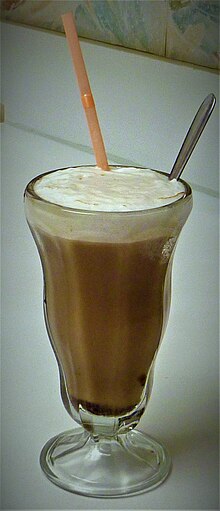food.wikisort.org - Beverage
An egg cream[1] is a cold beverage consisting of milk, carbonated water, and flavored syrup (typically chocolate or vanilla), as a substitute for an ice cream float.[2] Despite the name, the drink contains neither eggs nor cream.[3]
 | |
| Type | Fountain beverage |
|---|---|
| Country of origin | United States |
| Flavor | Various; primarily chocolate, but can be any flavored syrup |
| Ingredients | Flavored syrup, milk, soda water |
It is prepared by pouring syrup into the glass, adding milk, lightly stirring it with a spoon, then streaming soda water into the glass, mixing the other ingredients. Ideally, the glass is left with 2/3 liquid and 1/3 foamy head.[4]
The egg cream is almost exclusively a fountain drink. Although there have been several attempts to bottle it, none have been wholly successful, as its refreshing taste and characteristic head require mixing of the ingredients just before drinking.
Etymology theories and speculations
![The ingredients of an egg cream: Fox's U-Bet chocolate syrup,[5] seltzer, and whole milk](http://upload.wikimedia.org/wikipedia/commons/thumb/8/8d/Eggcreamparts.JPG/220px-Eggcreamparts.JPG)
The peculiarity that an egg cream contains neither eggs nor cream has been explained in various ways. Stanley Auster, who claims that his grandfather invented the beverage, has said that the origins of the name are "lost in time."[6]
The egg cream originated among Yiddish-speaking Eastern European Jewish immigrants in New York City, so one explanation claims that egg is a corruption of the Yiddish echt 'genuine or real', making an egg cream a "good cream".[7]
Food historian Andrew Smith writes: "During the 1880s, a popular specialty was made with chocolate syrup, cream, and raw eggs mixed into soda water. In poorer neighborhoods, a less expensive version of this treat was created, called the Egg Cream (made without the eggs or cream)."[8]
Another explanation comes from reports that it grew out of a request for chocolat et crème from someone, possibly the actor Boris Thomashefsky[9] who had experienced a similar drink in Paris.[10][11] His heavy accent altered the name into something like "egg cream," which then developed into the current term.
See also
- Italian soda
- Dirty soda
- List of chocolate beverages
References
- "The New York Egg Cream". ArcGIS StoryMaps. 19 December 2019. Retrieved 12 March 2022.
- Stuart, Marcia. "The New York Egg Cream". EGO. Epicurus.com. Archived from the original on 31 March 2015. Retrieved 12 March 2022.
- Arenstein, Noah (2014-11-19). "12 things you didn't know about NYC egg creams". Thrillist. Retrieved 12 March 2022.
- Stern, Michael and Jane (Jul 10, 1985). "Egg Cream is a delicacy at candy store in Bronx". The Evening Independent. p. 3B. Retrieved 29 March 2015.
{{cite news}}: CS1 maint: uses authors parameter (link) - Mead, Rebecca (8 August 2011). "Proustian". The New Yorker. Retrieved 12 March 2022.
- Mariani, John F. (1999). Encyclopedia of American Food and Drink. Lebhar-Friedman:New York.
- Ringler, Rachel (16 June 2021). "What is an egg cream and why is it so Jewish?". Jewish Telegraphic Agency. Retrieved 12 March 2022.
- Smith, Andrew F. (2014). New York City: A Food Biography. Rowman & Littlefield. p. 111.
- Gould, Jillian (2002). "Candy Stores and Egg Creams". Jews of Brooklyn. UPNE. p. 203.
- Stradley, Linda (17 April 2015). "New York Egg Cream Recipe and History". What's Cooking America. Retrieved 12 March 2022.
- Lee, Jennifer 8 (5 August 2008). "Can the Egg Cream Make a Comeback?". City Room. The New York Times Company. Retrieved 12 March 2022.
External links
- Beller, Daniel. "The True Origins of the Egg Cream". Mr Beller's Neighborhood.
- "Egg Cream". Gerritsen Beach.
- "Egg cream recipe". H. Fox & Co. Archived from the original on 2006-08-10.
- "Egg Cream recipe". JayKeller.com.
- National Egg Cream Day @ eggcreamday.com
- Wharton, Rachel. "The Return of The Egg Cream". Brooklyn Eats. Heritage Radio Network. Archived from the original on 14 January 2011. Retrieved 2 January 2011. (Radio episode)
Другой контент может иметь иную лицензию. Перед использованием материалов сайта WikiSort.org внимательно изучите правила лицензирования конкретных элементов наполнения сайта.
WikiSort.org - проект по пересортировке и дополнению контента Википедии
